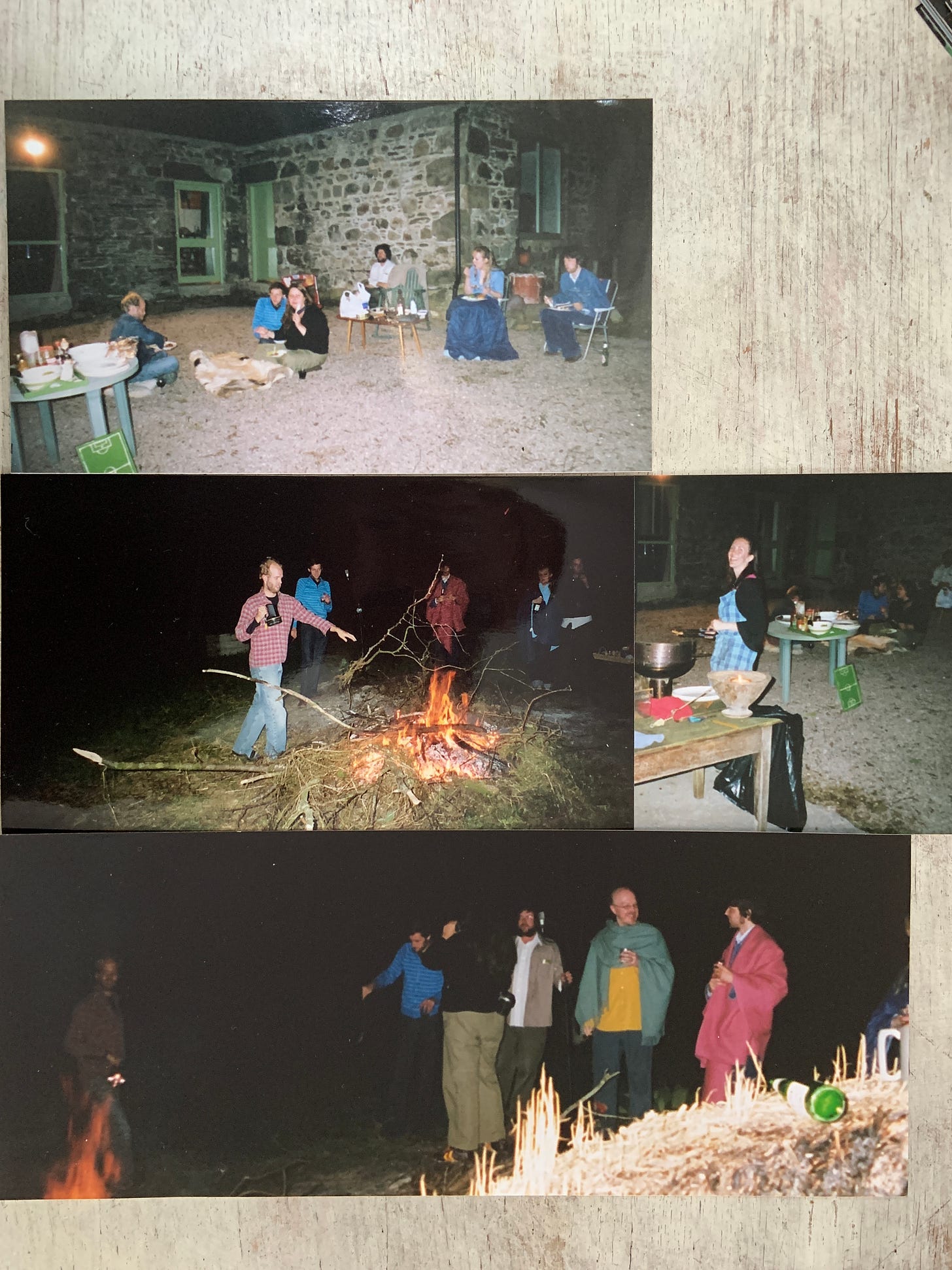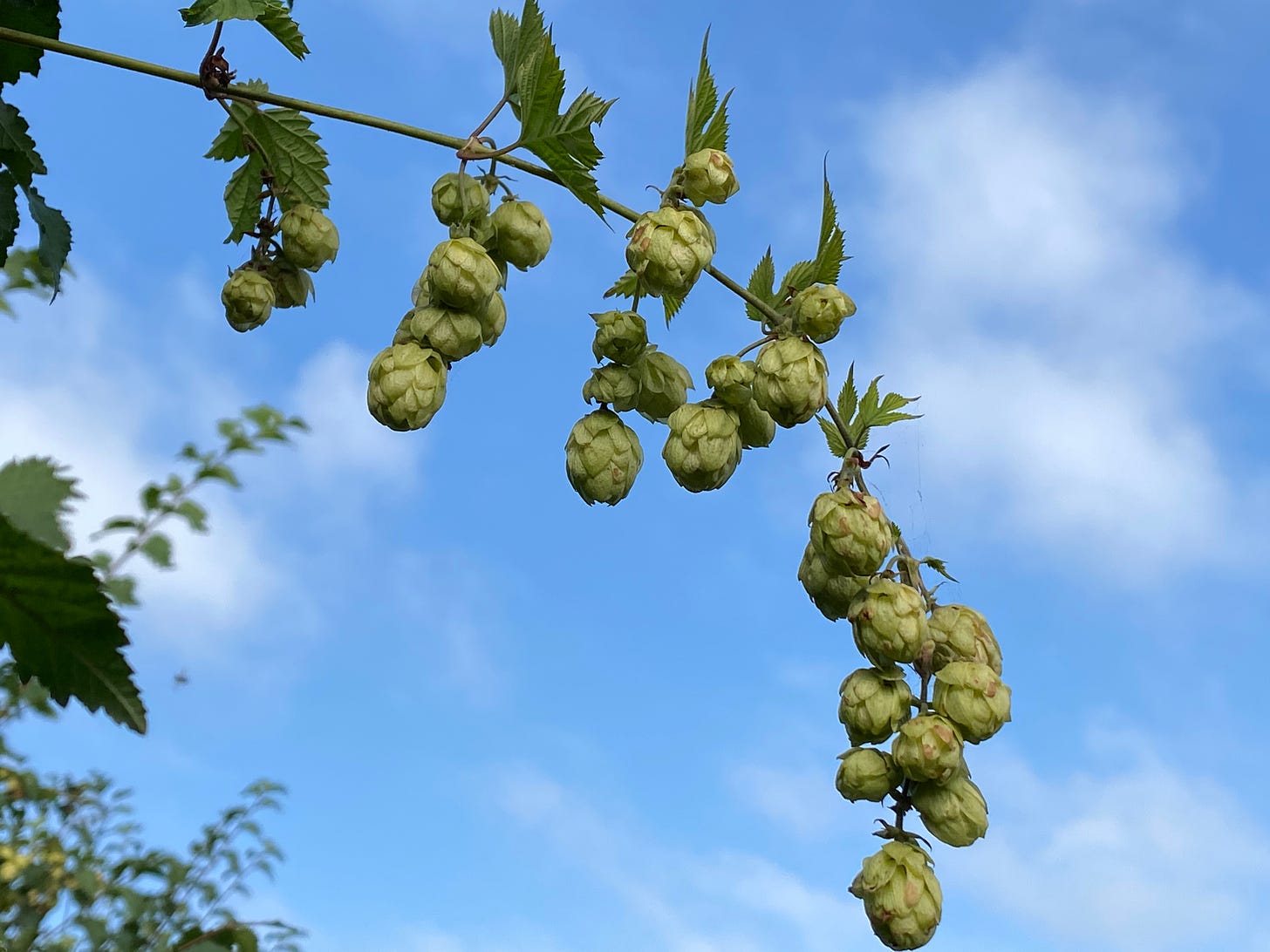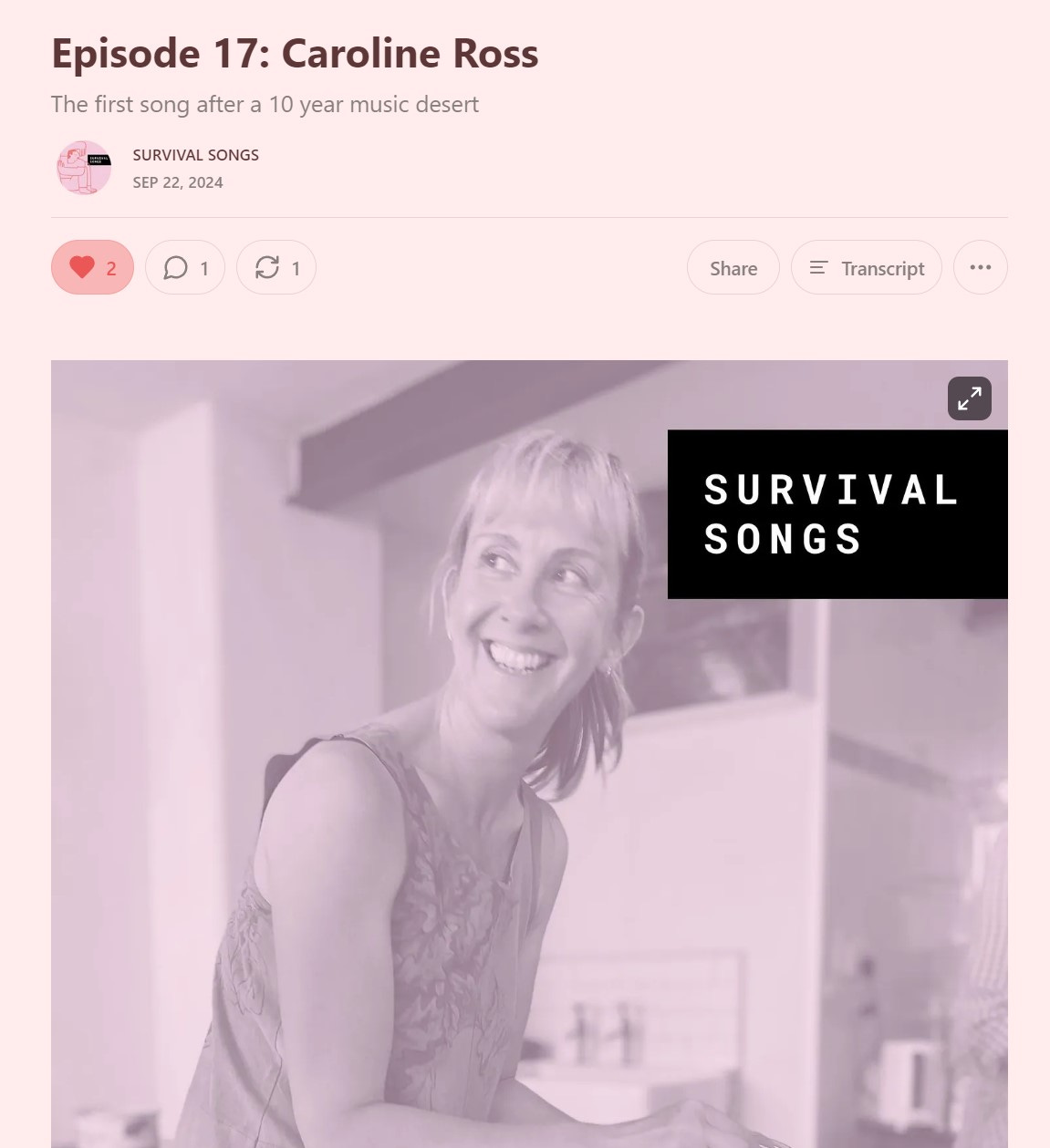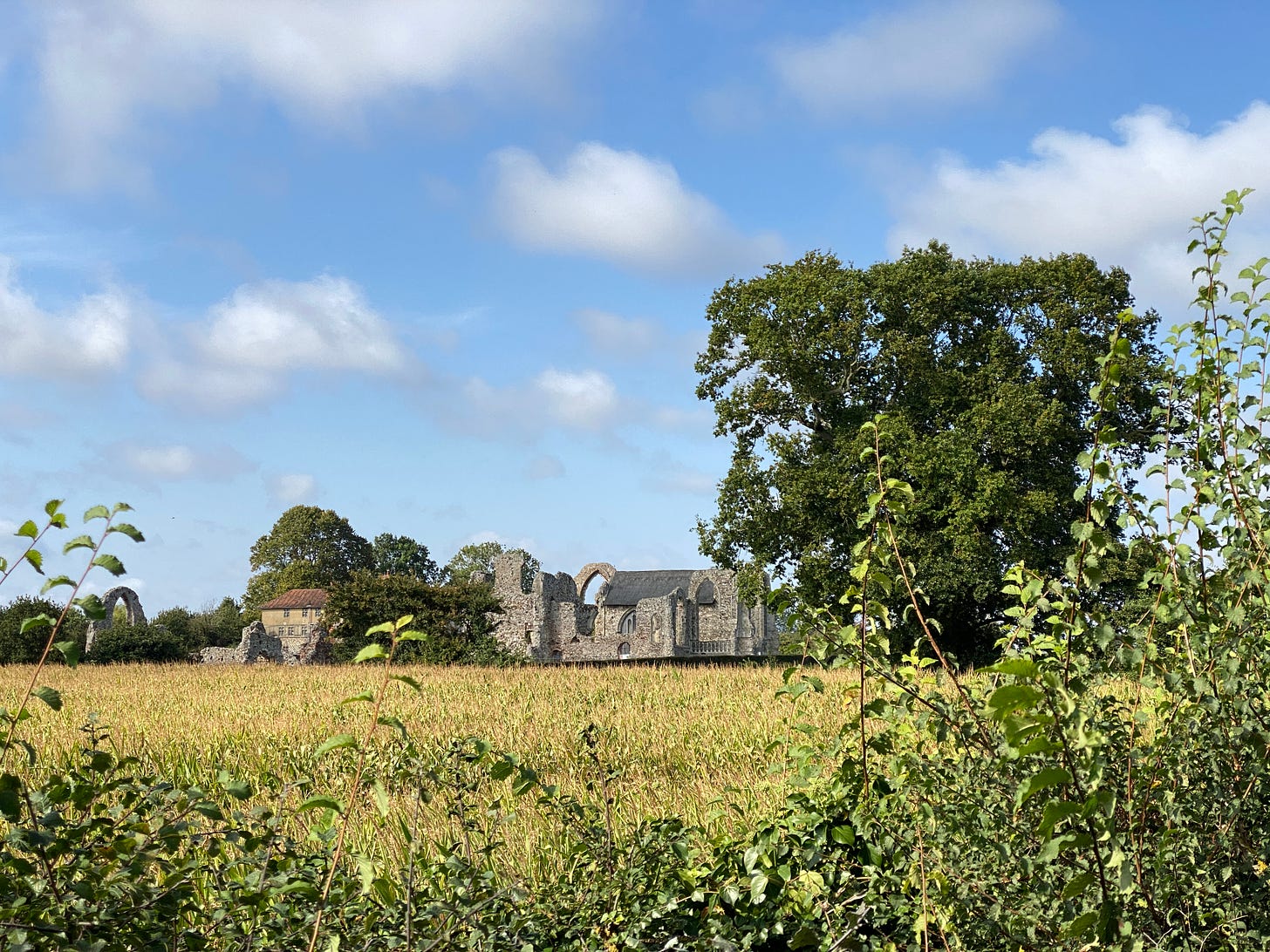I want to write about music and silence. It’s a few weeks earlier than planned, as yesterday I got the heads up from
that our episode on her podcast was coming out on Sunday 22nd September, a month before I expected. So why not listen to that now, before reading this? You can click here. It’s only 20 minutes long and it’ll give you more depth on some of the topics in today’s post.1Fast
Have you ever just stopped doing a thing you really loved for a decade? What happened when you came back to it? Had anything changed?
I spent ten years writing, recording and playing music in a series of bands2 (after a few years in my teens doing the same, but only in my bedroom on a four-track recorder). Like many 1990s artists, we started out Indie, got progressively weirder with Post-rock and via Jazz, Prog, Ambient and Beats eventually made our way into the ‘we don’t know where to file this band’ section of shops, which was probably where we belonged. Our label Day Release Records3 put out a strange mix of Post-rock, including tracks by members of Godspeed You! Black Emperor, and Wuss-Core by The Fairys. We followed our ears, and apart from me having occasionally been an extremely moody and probably highly annoying, band-mate at times,4 I have no regrets.
In 2007 I stopped making music entirely, sold or gave away all my instruments and completely ceased voluntarily listening to music. In the podcast above I mention that my ears felt over-loaded and that I needed to quieten down the over-analytical aspect of a mind that had spent years at a mixing desk, listening for frequencies or assessing the song structure. I knew I needed to hear music afresh and I didn’t know how.
But that’s not all of it. In many ways, I now feel I had developed a ‘fear of music’.5 I have never quite been able to get a handle on it, but having only recently returned to avid reading after a lockdown which saw this life-long book worm go from devouring a book a week to barely a book every two months, I think I have finally spotted a clue. Perhaps it will chime with those of you who have also inexplicably walked away from perfectly healthy joys and left friends scratching their heads.
Everything or Nothing
I am fifteen and in a Physics lesson. Dr Pratt6 has set up ten workstations for a test and all we have to do is go round and read meters, test voltages, amperes, ohms, and so on. Several of the meters have been deliberately been set wrongly, without the dials or needles at zero. This is part of the test, but I fail to grasp the context entirely and put my hand up, asking why the meters are wrong. Dr Pratt can’t answer without negating the entire purpose of the class for everyone and shoots me a pained glance before walking away. I can’t get my head around anything and proceed to get my one ‘D’ in any test in the whole of my senior school career. I am mortified.
As surely, being wrong means I am bad, right?
A lifetime later, after decades in the paradoxical study of T’ai Chi and immersing myself in the wisdom of Tao and The Master and His Emissary, I have much compassion for that embattled teen, entrenched in her left hemisphere, keeping an inexplicable world at bay. It appeared that despite loving maths and science more than almost anything, and already being a musician, that if I missed a vital part of the context of a topic within those subjects, nothing that followed could be learned or retained. So, for example, in electronics: in reality, the electrons flow the other way than the conventional symbols show, meaning that entire topic was always a mystery to me, (whereas radioactivity or gravity, though certainly more nebulous in reality, were much less problematic to my young mind as their models made sense to me). Similarly in Music, though I already wrote complex songs and performed them, the relationship between the tones I heard in my head and their abstract notation on the stave meant nothing to me. Despite twice more attempting to learn music notation as an adult, I have yet to successfully read music. Tablature for bass and guitar is no problem, as it is a diagram of the neck of the instrument and requires no leap of …
Of what, exactly?
There is a gap. Or rather, there was a gap; a fearful void. A place where there was a risk of not knowing. In my youth I did not have the faith to leap into things I did not feel I could understand, or at least grasp, almost immediately. Now, I actively seek out the unknowable and I can remain mobile and comfortable, if not exactly happy, when I am somewhat confused by a totally new context. This has been one main outcome of the path I was called to walk, thank goodness.
A feast, deferred
To circle back around to music and silence. When I was completely immersed in music, part of me felt I somehow contained all music by being involved in its making, being part of a scene, staying aware of what was being released. When I stepped back onto the dry bank beside the river of music, I suddenly saw the immensity of the flow, the incessant rush of music, of sound of every kind. I think I got spooked and that the same thing has happened since with other cultural flows, such as books, films, radio and television. Speaking to dear friends who have had later-life diagnoses of neurodivergence, it has been heartening and enlightening to hear the way they talk about aspects of overload, mental processing and their unique modes of understanding. The thing each friend has in common, no matter which ‘label’ they have come to find helpful, is the insistence that silence and reduction of sensory overload are a necessary part of their mental and physical well-being.
By consciously opting out of music for ten years, I made a space for my mind to rest and allowed myself to be completely out of touch with what had once been my everyday work. It was a relief, not to have to stay up to date or have an opinion about new music. I have felt the same about books, radio, movies…
But now, all these art forms are returning, in a new way, without the grasping gestures of mind seeking to know everything about each work, to be able to cleverly take them apart and explain their inner workings. The same could now be said about my approach to teaching T’ai Chi, as I no longer stay abreast of who is teaching where, which masters have died and who are the lineage holders. Perhaps now, I am again an amateur, one who does things for the love of it.
What I do remember is one time when we were all hands on the mixing desk in about 1998. Somehow the vocal just sounded lost, too weak in the mix. Toby our then producer didn’t turn the vocals up, but instead took out many of the mid-tones of guitar, bass and even the drums and suddenly there was room for the vocals, you could hear every word. By removing much of what was unnecessary, he made the space for what was essential. This was our first lesson in the wu-wei of record production, from a real master.
How I got back to music is related in the podcast and involves impatient swans, hormonal carnage and a lot of dancing around my boat, so I won’t repeat that here, as you can go and listen.
What I can see now is that these periods of very long fasting from an artform, lifeway or activity, usually 4-10 years at a time, actively nourished my connection to what it was I appeared to have turned away from. Speaking recently to an Orthodox friend about the liturgical year, he said how much the long, strict fasts of his path have intensified the joy he has in sharing feasts and celebration foods with his family. I feel similarly, in returning to listening to music in 2017 and to teaching T’ai Chi this year, for instance, after a four year break, I can feel my palate has been cleansed and freshness has returned in each instance. The need to ‘have it all under my belt’ has abated, and sound, silence, movement and stillness can take their rightful places in my life.
More on the via negativa, silence and stillness in a future post. Plus how contemporary life fights our instincts towards healthy sense-fasting. But for now, it is time to wish you a peaceful week ahead and for me to walk down to the sea and greet the Solent, which I have not seen for seven days, while I was in Suffolk.

This week’s good thing: It has been many years since I had the heart to go through my few printed photographs or my one remaining hard drive from the loss of my studio. This month I gave the prints to friends and loved ones and saved a few for my own new album. It felt like a fresh start. In the process, I checked the old hard drive after years of avoiding it, and to my delight found about 20 tracks from my music life that I had thought long lost, when searching for the lyrics to be published by Lo Recordings on the new Susumu Yokota box set coming out next year, which features my words and vocals. I am back in contact with my old music writing partner, Jim Version, and I hope we can put lots of things online next year, for fun, for posterity, and for old bandmates to find. But until then, here’s a previously unreleased song The Shape Of Prayer from the 2005 sessions for the Tells album Hope Your Wounds Heal. It’s not a perfect mix, but it’s a heartfelt song. Jim’s on guitar, I am on vocals and bass, Jo Wright arranged and played trumpet. We played it live only once at the Forgue Village Hall in deepest Aberdeenshire with a full band and orchestration. Lyrics are below. Enjoy.
The Shape Of Prayer
It started right about your age
Say right there step into the cave
Lock your door behind you be safe
The armies at your door won’t say no
Till your heart collaborates
And they won’t go
Till your strength evaporates
So on knees and on hands
You crawl and lie in the shape of prayer
You crawl and lie in the shape of prayer
The shape of prayer
Give us all your peace
Rest
Rest in this only
Even after the war is over
Our hearts will still raise armies inside
Lyrics Caroline Ross, Music Jim Version / Caroline Ross 2005.
If you would like to comment but cannot afford a subscription, just reply to this email and I will comp you 6 months for free.
Ironically, for the last three days I have had terrible tinnitus, mainly from allergies, I think, which inflame the sinuses and exacerbate the ringing. So behind all these words on not listening to things, feel free to imagine a loud chiming sound, a high pitched hiss and a kind of roaring, pressing sensation. Or maybe best not.
Ripley 3, Delicate AWOL, Rothko, Tells. Plus tracks on a Stewart Lee compilation, LPs by Mountain Men Anonymous, Susumu Yokota, Nobu, and backing vocals on music by Alastair Roberts, The Great Depression, Scatter and some other things that for the life of me I can’t remember…
Our great label manager James Nicholls went on to run Fire Records, produce King Rocker and cocreate Weird Walk. I would love to catch up with him again…
Apologies to any ex bandmates. Drinks are on me if you get in touch.
Q: How many lead singers does it take to change a lightbulb?
A: Just one, she holds up the bulb, then waits for the world to revolve around her.
Also the title of an excellent LP by Talking Heads.
Yes that was his real name and no we never took the piss, which was a testament to what an excellent teacher he was.










Loved the podcast. I came to the Unthanks via their song Magpie, whose drone and harmonies literally rattle my bones and always give me chills. I realize that the song that has a direct line to my heart is If it be Your Will, a Leonard Cohen song performed by the Webb Sisters. When I need a sonic catalyst to help tug me back to my feelings, this is it.
Interesting podcast. I spent most of my working life obsessed with the arts particularly theatre. I worked as an administrator rather than an artist. I have now moved completely away from the arts. I now work as a counsellor. I wonder if I will return to it. Probably not as I am now 66 but it would/will be nice to find another passion. Suzanne